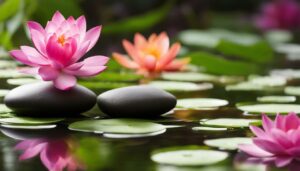Over the past 20+ years, Reiki has emerged as a powerful self-care tool for transformative healing and balance. This practice nurtures the mind, body, and soul by restoring the natural flow of energy and encouraging deep relaxation. By embracing Reiki and mindfulness, individuals become active participants in their own healing journey, embracing holistic well-being.
Key Takeaways:
- Reiki is a powerful self-care tool for transformative healing and balance.
- It restores the natural flow of energy and encourages deep relaxation.
- By embracing Reiki and mindfulness, individuals become active participants in their own healing journey.
- Reiki and mindfulness promote holistic well-being.
- They nurture the mind, body, and soul.
What is Reiki Healing?
Reiki is a powerful energy healing practice that has been used for centuries to promote holistic well-being and restore balance to the mind, body, and spirit. This ancient technique involves the channeling of universal life force energy through the hands of a trained practitioner to facilitate healing and deep relaxation.
Through the gentle touch or hovering of hands over the body, Reiki helps to clear energy blockages, release stress, and activate the body’s natural healing abilities. It works on the principle that when the energy flow within us is disrupted or blocked, we may experience physical, emotional, or spiritual imbalances. By restoring the flow of energy, Reiki can bring about a sense of peace, harmony, and overall well-being.
| Benefits of Reiki Healing | Holistic Healing |
|---|---|
| Reduces anxiety and stress levels | Addresses the root cause of imbalances |
| Promotes relaxation and deep rest | Enhances the body’s natural healing process |
| Boosts energy levels and vitality | Supports emotional and mental well-being |
| Encourages self-awareness and self-care | Nurtures the mind, body, and spirit |
Reiki healing is a gentle and non-invasive practice that can be received by anyone, regardless of age or background. It complements other healing modalities and can be used to support various physical and emotional conditions. Many individuals find Reiki to be a transformative experience that helps them connect with their inner selves and tap into their innate healing abilities.
The Science Behind Reiki Healing
While the mechanisms of how Reiki works are still being studied, research suggests that it may have profound effects on the body’s biofield, energy centers, and overall well-being. Studies have shown that Reiki can induce a state of deep relaxation, reduce stress hormones, and promote the activation of the parasympathetic nervous system, which is responsible for rest and relaxation.
Additionally, Reiki has been found to have positive effects on measures of pain perception, immune function, and psychological well-being. It is believed that the healing energy of Reiki works on a subtle level, addressing imbalances within the energy field and promoting a sense of wholeness and vitality.
Overall, Reiki healing offers a gentle and effective approach to holistic well-being, supporting the body’s natural healing abilities and promoting a deep sense of relaxation, balance, and harmony.
Finding a Reiki Practitioner
When it comes to embracing the benefits of Reiki and holistic healing, finding a qualified Reiki practitioner is essential. A skilled practitioner will have advanced knowledge and expertise to ensure a potent and impactful healing experience. Whether you are seeking in-person sessions or distance Reiki, the right practitioner can guide you on your healing journey.
Here are a few steps to help you find a Reiki practitioner:
- Research and referrals: Start by researching Reiki practitioners in your area or ask for referrals from trusted friends or family members who have had positive experiences.
- Qualifications and certifications: Look for practitioners who have completed comprehensive training and are certified in Reiki. This ensures that they have received proper training and adhere to professional standards.
- Initial consultation: Schedule an initial consultation with potential practitioners to discuss your needs and goals. This allows you to gauge their expertise, communication style, and overall compatibility.
- Experience and specialization: Inquire about the practitioner’s experience and any specialized areas of focus. Some practitioners may have expertise in specific areas such as pain management, emotional healing, or spiritual development.
- Intuition and comfort: Trust your intuition when choosing a practitioner. It’s important to feel comfortable and safe during your healing sessions, as this will enhance the overall effectiveness of the Reiki energy.
Remember, finding the right Reiki practitioner is a personal process. Take your time, ask questions, and listen to your instincts. With the guidance of a skilled practitioner, you can experience the profound benefits of Reiki and embark on a transformative healing journey.
Testimonial
“Finding a Reiki practitioner was a game-changer for me. I had been struggling with chronic pain and emotional stress for years. Working with a skilled practitioner not only alleviated my physical symptoms but also helped me find inner peace and balance. I encourage anyone seeking holistic healing to invest in finding a qualified Reiki practitioner. It’s truly life-changing!”
Table: Questions to Ask When Choosing a Reiki Practitioner
| Questions | Importance |
|---|---|
| Are you certified in Reiki? | High |
| What is your experience with Reiki? | High |
| Do you have any specialized areas of focus? | Medium |
| What types of healing sessions do you offer? | Medium |
| What can I expect during a Reiki session? | High |
| What are your rates and session durations? | Low |
| Do you offer distance Reiki sessions? | Medium |
| Can you provide any client testimonials? | Medium |
Exploring Reiki Levels and Chakras
Reiki is a holistic healing practice that encompasses different levels of mastery. Each level of Reiki deepens the understanding and connection with the healing energy. It starts with level 1 and progresses to mastership, allowing practitioners to access higher levels of Reiki energy and healing techniques.
Understanding the chakras is an integral part of Reiki practice. Chakras are the energy centers within the body that play a vital role in maintaining overall well-being. There are seven main chakras, each associated with different physical, emotional, and spiritual aspects.
Here is a table summarizing the different Reiki levels and their corresponding chakras:
| Reiki Level | Chakras |
|---|---|
| Level 1 | Root Chakra |
| Level 2 | Sacral and Solar Plexus Chakras |
| Level 3 | Heart and Throat Chakras |
| Master/Teacher | Third Eye and Crown Chakras |
As practitioners advance through the different levels of Reiki, they gain a deeper understanding of the chakras and their role in energy healing. This knowledge allows for a more comprehensive approach to mindfulness practices and self-care techniques, as the chakras are closely intertwined with our overall well-being.
Reiki for Anxiety and Weight Loss
Reiki, with its healing energy, offers a range of benefits that can help alleviate anxiety and support weight loss journeys. By channeling this universal life force energy, Reiki practitioners promote relaxation, reduce stress, and restore balance to the mind, body, and spirit.
One of the ways Reiki aids in anxiety relief is through its ability to calm the nervous system. As Reiki practitioners lay their hands on or near the body, the healing energy flows to where it is needed most, helping to release tension and promote a sense of calm. This soothing energy can help individuals manage anxiety symptoms and promote emotional well-being.
When it comes to weight loss, Reiki supports a holistic approach by fostering mindfulness and developing a healthy mind-body connection. Reiki sessions can enhance an individual’s awareness of physical sensations and promote mindful eating practices. By being more present and attuned to their body’s needs, individuals can make conscious choices that support their weight loss goals. Additionally, Reiki can help individuals address emotional and energetic blockages that may be hindering their progress towards weight loss.
The Power of Mindfulness in Reiki:
Mindfulness is a core aspect of Reiki practice. By combining Reiki with mindfulness techniques, individuals can unlock deeper self-awareness and develop a greater sense of empowerment. Mindfulness practices such as meditation, deep breathing, and body scanning can enhance the effects of Reiki, allowing individuals to tap into their inner wisdom and make self-care a priority.
When mindfulness and Reiki are integrated into one’s daily routine, they can have a synergistic effect, amplifying the benefits of both practices. Together, they create a powerful tool for anxiety relief, weight loss support, and overall well-being.
Discover the transformative effects of Reiki and mindfulness practices and embark on a journey of self-care, healing, and empowerment. Embrace the potential for inner peace and wellness as you nurture your soul through Reiki and mindfulness.
Learning Reiki: A Journey of Self-Discovery and Healing
Learning Reiki is not just about mastering a healing technique; it is a transformative journey of self-discovery and healing. As individuals delve into the practice of Reiki, they unlock new depths of understanding and connection with the healing energy within themselves. Each level of Reiki mastery brings them closer to their own potential for healing and growth.
Throughout the journey of learning Reiki, practitioners develop mindfulness practices that support their self-healing and personal development. These practices foster a deep sense of self-awareness and presence, allowing individuals to tap into their inner wisdom and intuition. By cultivating mindfulness, practitioners enhance their ability to channel and direct healing energy, leading to profound and lasting results.
Benefits of Reiki Self-Healing
Reiki self-healing is a fundamental aspect of the Reiki practice. It allows individuals to take an active role in their own well-being and supports them in addressing physical, emotional, and spiritual imbalances. Through self-healing techniques, practitioners can release stagnant energy, clear blockages, and restore balance within their own energy system.
| Benefits of Reiki Self-Healing | Key Points |
|---|---|
| Physical Well-being | Reiki self-healing promotes relaxation and reduces stress, which can have a positive impact on overall physical health. |
| Emotional Balance | Reiki helps individuals process and release emotions, fostering emotional well-being and inner peace. |
| Spiritual Connection | Reiki self-healing deepens the connection with one’s spiritual essence, providing a sense of purpose and meaning. |
By embracing Reiki as a tool for self-care and self-discovery, individuals can unlock their potential for inner peace, healing, and personal transformation. Through mindfulness practices and self-healing techniques, they embark on a journey of self-discovery that empowers them to become active participants in their own well-being.
What Does Self-Care Mean from a Spiritual Perspective?
In today’s fast-paced and hectic world, self-care has become essential for maintaining overall well-being and balance. However, self-care extends beyond physical and emotional needs – it also encompasses the spiritual aspect of our being. From a spiritual perspective, self-care is about nurturing the soul and connecting with our true essence.
Spiritual self-care practices focus on cultivating a deeper sense of awareness, finding inner peace, and aligning with our higher purpose. These practices include:
- Self-Love: Embracing self-love and compassion is a vital aspect of spiritual self-care. It involves treating ourselves with kindness, forgiveness, and acceptance.
- Meditation: Regular meditation practice allows us to quiet the mind, find stillness, and connect with our inner wisdom. It helps us gain clarity, reduce stress, and cultivate a sense of peace.
- Finding Joy: Engaging in activities that bring us joy and happiness is an essential part of spiritual self-care. Whether it’s spending time in nature, pursuing creative hobbies, or connecting with loved ones, finding joy nourishes our soul.
- Connecting with Others: Building meaningful connections and fostering relationships with others is an integral part of spiritual well-being. It involves engaging in deep conversations, showing empathy, and offering support to others.
- Spending Time in Nature: Nature has a profound healing effect on our spiritual well-being. Spending time outdoors, immersing ourselves in the beauty of the natural world, and connecting with the earth’s energy can rejuvenate and inspire us.
Spiritual self-care is a holistic approach that recognizes the interconnectedness of the mind, body, and spirit. By incorporating these practices into our daily lives, we can nurture our soul, find inner peace, and experience a deeper sense of well-being.
“Self-care is not selfish. It is essential for reconnecting with our true essence and nourishing our soul.” – Unknown
Techniques to Unlock Your Mindful Soul
To cultivate mindfulness and unlock your mindful soul, there are various techniques that can be incorporated into your daily life. These practices promote being fully present and aware of the present moment, allowing you to experience the benefits of mindfulness in your overall well-being.
Mindfulness Meditation
Mindfulness meditation is a powerful technique that involves focusing your attention on the present moment without judgment. Find a quiet and comfortable space, close your eyes, and bring your attention to your breath. Allow your thoughts to come and go without attaching to them, gently redirecting your focus back to the breath whenever your mind wanders. This practice trains your mind to be more present, reducing stress and promoting a sense of calm and clarity.
“Mindfulness meditation is the practice of being fully present in the moment, observing your thoughts and sensations without judgment. It allows you to cultivate a deep connection with yourself and the world around you.” – Dr. Sarah Thompson
Mindful Eating
Mindful eating is a practice that involves paying close attention to the sensations, thoughts, and emotions that arise while eating. Slow down and savor each bite, engaging your senses to fully experience the texture, flavor, and aroma of the food. Notice how your body responds to each bite, and listen to your body’s signals of hunger and fullness. This practice helps develop a healthier relationship with food, promotes gratitude, and encourages mindful choices that support your well-being.
Exercise and Movement
Engaging in regular exercise and movement can be a powerful way to cultivate mindfulness. Whether it’s going for a walk in nature, practicing yoga, or participating in a physical activity you enjoy, focus your attention on the physical sensations of your body moving. Be aware of your breath, the feel of your muscles working, and the sensation of movement. This practice not only promotes physical well-being but also helps cultivate a deeper connection with your body and the present moment.
By incorporating these techniques into your life, you can unlock your mindful soul and experience the profound benefits of mindfulness in nurturing your mind, body, and soul.
| Techniques | Benefits |
|---|---|
| Mindfulness Meditation | Reduces stress, promotes calm and clarity |
| Mindful Eating | Develops a healthier relationship with food, promotes gratitude |
| Exercise and Movement | Promotes physical well-being, cultivates a deeper connection with the body |
Conclusion
Mindfulness and Reiki self-care offer powerful tools for nurturing the mind, body, and soul. By embracing these practices, individuals can tap into their true potential for healing and growth. Mindfulness allows for the cultivation of awareness and presence, while Reiki energy healing restores balance and harmony.
Together, they provide a holistic approach to self-care that brings about profound positive changes in one’s overall well-being. By incorporating mindfulness techniques such as meditation, mindful eating, exercise, and yoga into our daily lives, we can deepen our connection to the present moment and unlock our mindful soul.
With Reiki as a supportive practice, individuals can channel healing energy to remove blockages, alleviate anxiety, and support weight loss journeys. The combination of mindfulness and Reiki self-care empowers individuals to become active participants in their own well-being, fostering self-discovery and personal healing.
Embrace the journey of self-care and unlock the potential for inner peace and wellness. By prioritizing mindfulness and Reiki self-care, individuals can experience a profound transformation of the mind, body, and soul, embracing holistic healing in their lives.




